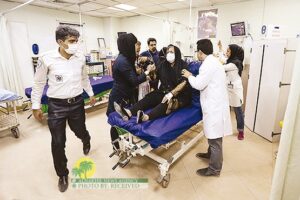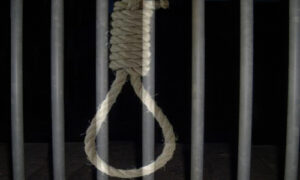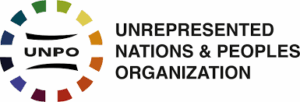campaign, which has so far seen nearly 400 hanged in some of the worst state violence in Iran’s recent history.
Iranian authorities moved two prominent Ahwazi Arab prisoners from Karoun Prison to an undisclosed location on 7 December, prompting fears they could be executed.
Iran Human Rights has called for the Iranian authorities toimmediately commute the death sentences of the men, who were subjected to torture and unfair trials that have been condemned by several UN experts. IHR’s appeal comes just days after four other Ahwazi Arab prisoners were taken from Karoun Prison and executed.
Hashem Shabani (32) and Hadi Rashedi (38) were sentenced to death for Moharebeh (“enmity against God”), Mufsid-fil-Arz (“corruption on earth”) and spreading propaganda against the systemin July 2012 alongside three other political prisoners: Mohammad Ali Amouri, Sayed Jaber Alboshoka and Sayed Mokhtar Alboshoka. Another, Rahman Asakereh, was sentenced to 20 years imprisonment. All are founding members of Al-Hiwar, a cultural institutethat promoted Arabic education, literature and cultural activities among deprived Ahwazi Arab youth. They were subjected to torture for long periods before their trials, apparently in an attempt to force them to confess to various crimes. Both Shabani and Rashedi were taken from Karoun Prison in July/August and held for weeks by the Ministry of Intelligence where they suffered further torture.
Hadi Rashedi, single was arrested on 28 February 2011 with his brother Habibullah Rashidi, former chair of Khalafabad municipal council. A highly qualified post-graduate with an MSc in chemistry, he worked in local high schools as a teacher. He has a keen interest in cultural issues and is an advocate for the poor. He suffers from heart disease and as such is exempt from military service. Before his trial, Rashedi suffered considerable mental stress, developing a serious digestive disorder as a result. As a result of beatings, he suffered a fractured hip. He also appeared in a documentary aired by Iran’s Press TV in which he was forced to confess to firing a gun at buildings housing security personnel and government officials in Khalafabad. He was described as a member of the ‘Khalq-e Arab’ (Arab People), although no single organisation operates with this name.
Hashem Shaabani, arrested in February 2011, is originally from Ahwaz City and a resident of Khalafabad. He is married with one child and before his arrest he took care of his elderly parents. He has a Bachelor degree in Arabic language, literature and education and holds a Masters degree in Political Sciences from Ahwaz University. He has written poetry in Arabic and Farsi and teaches Arabic language and Arabic literature in high schools. He is a cultural, civil and student activist and also a blogger. His father Khalaf Shaabani was disabled while fighting Iraqi forces during the Iran-Iraq War. In December 2011, he was featured on Iran’s international television station Press TV in which he was forced to confess to being involved in separatist terrorism and supporting Ba’athism in Iraq. He was also made to claim that he had assistance from Hosni Mubarak and Muammer al-Qadafi, the former rulers of Egypt and Libya. Those who know him state that he has never supported armed insurgency against the Iranian state, let alone had contact with foreign governments.
In a letter smuggled out of prison, Shabani wrote that he had written blogs and essays critical of the treatment of minorities in Iran, including “hideous crimes against Ahwazis perpetrated by the Iranian authorities, particularly arbitrary and unjust executions. Through this reporting, I was defending the legitimate right that every nation in this world should have which is the right to live freely with full civil rights. With all these miseries and tragedies, I have never used a weapon to fight these atrocious crimes except the pen.”
Insisting on his innocence and demanding a retrial before an impartial court, Shabani concluded his letter stating “I would like to confirm that I have never participated in any armed activity whatever the motives. I disagree with armed activities if there are other peaceful channels to make demands and express our wishes and aspirations.”
The death sentences against the men were met with condemnation by a group of five United Nations independent experts in January. The Special Rapporteurs urged the Iranian authorities to halt the executions and expressed grave concern over torture and other ill-treatment in detention where they were forced to sign confessions.
The Special Rapporteur on torture, Juan E. Méndez, said: “This is not only in breach of Iran’s international obligations under the international covenant, which imposes an outright prohibition on torture, it is also in breach of Iran’s Constitution that explicitly forbids the use of all forms of torture for the purpose of extracting confessions or acquiring information.”
The UN Independent Expert on minority issues, Rita Izsák added: “I urge the Government of Iran to halt these executions and to review the decisions of the courts to ensure that all human rights, including minority rights, are fully upheld and respected in practice.”
In his presentation to the UN Human Rights Council, UN Special Rapporteur on Iran Ahmed Shaheed said: “five Ahwazi Arab men were convicted of among other charges ‘spreading propaganda against the system’ and sentenced to death in connection with their founding of an Arab minority linguistic and cultural organization named ‘Al-Hiwar.’ Reports from multiple sources indicate that all five men were mistreated or tortured while in detention, and that they were not afforded fair trials. I urge the Iranian government to officially halt the execution of these cultural activists, two of whom are teachers, and to take every effort to investigate the aforementioned allegations.”
The European Union subsequently imposed sanctions on judge Seyyed Mohammad Bagher Moussavi of Branch 2 of the Ahwaz Revolutionary Court who sentenced the men to death as well as the officials responsible for broadcasting the “confessions”, head of IRIB World Service and Press TV Muhammad Sarafraz and Press TV newsroom director Hamid Reza Emadi.



















+ There are no comments
Add yours